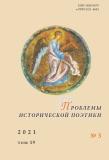Мифологема Орфея в античной культурной традиции
Mythology of Orpheus in Classical Cultural Tradition
Author(s): Elena V. GnezdilovaSubject(s): Comparative Study of Literature, Eastern Slavic Languages, Ancient Philosphy, Philology, Sociology of Religion
Published by: Петрозаводский государственный университет
Keywords: myth of Orpheus; philosophical and religious teachings; Orphism; antiquity; comparative historical poetics; mythopoetics; mythological intellection;
Summary/Abstract: The article examines the peculiarities in the formation of the Orpheus mythologeme in the ancient cultural tradition. An analysis of the works of ancient authors, including Pindar, Aeschylus, Euripides, Apollonius of Rhodes, Virgil and Ovid allows to single out the specifics of creating the image of Orpheus. The latter is seen by the above-mentioned authors not only as a poet and musician who had lost his beloved Eurydice, but also as the founder of cult rites known as Orphic mysteries. “Orphism” as a system of religious and philosophical views became most widespread in the era of Peisistratus in the 6th century BC in Attica. Dionysus, revered by the Orphic, was important for farmers as a deity of eternal rebirth and powerful natural forces. In the ancient cultural tradition, the image of Orpheus develops under a double sign: both Apollo and Dionysus. The ideas of Orphic philosophy can be found in the religious and philosophical teachings of the Pythagorean school and in the writings of Plato. The original transformation of the Orphic-Pythagorean ideas and the mythologeme of Orpheus occurs in Virgil’s Georgics and Ovid’s Metamorphoses, which are also the subject of this article. The comparative historical analysis of artworks and philosophical treatises of antiquity carried out in the course of this study indicates that the mythologeme of Orpheus in the ancient cultural tradition is an example of the embodiment of the syncretic unity of art and religion in the archaic consciousness.
Journal: Проблемы исторической поэтики
- Issue Year: 19/2021
- Issue No: 3
- Page Range: 35-52
- Page Count: 18
- Language: Russian

